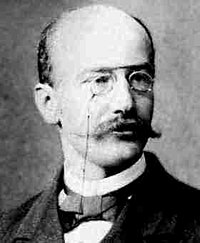Ferdinand von Lindemann
Ferdinand von Lindemann | |
|---|---|
 Carl Louis Ferdinand von Lindemann | |
| Born | 12 April 1852 |
| Died | 6 March 1939 (aged 86) |
| Nationality | German |
| Alma mater | Friedrich-Alexander-Universität Erlangen-Nürnberg |
| Known for | Proving π to be a transcendental number Lindemann–Weierstrass theorem |
| Scientific career | |
| Fields | Mathematics |
| Institutions | University of Munich |
| Doctoral advisor | C. Felix Klein[1] |
| Doctoral students | |
Carl Louis Ferdinand von Lindemann (12 April 1852 – 6 March 1939) was a German mathematician, noted for his proof, published in 1882, that π (pi) is a transcendental number, meaning it is not a root of any polynomial with rational coefficients.
Life and education
Lindemann was born in Hanover, the capital of the Kingdom of Hanover. His father, Ferdinand Lindemann, taught modern languages at a Gymnasium in Hanover. His mother, Emilie Crusius, was the daughter of the Gymnasium's headmaster. The family later moved to Schwerin, where young Ferdinand attended school.
He studied mathematics at Göttingen, Erlangen, and Munich. At Erlangen he received a doctorate, supervised by Felix Klein,[1] on non-Euclidean geometry. Lindemann subsequently taught in Würzburg and at the University of Freiburg. During his time in Freiburg, Lindemann devised his proof that π is a transcendental number (see Lindemann–Weierstrass theorem). After his time in Freiburg, Lindemann transferred to the University of Königsberg. While a professor in Königsberg, Lindemann acted as supervisor for the doctoral theses of the mathematicians David Hilbert, Hermann Minkowski, and Arnold Sommerfeld.[2][3]
Transcendence proof
In 1882, Lindemann published the result for which he is best known, the transcendence of π. His methods were similar to those used nine years earlier by Charles Hermite to show that e, the base of natural logarithms, is transcendental. Before the publication of Lindemann's proof, it was known that if π was transcendental[by whom?], with Johann Heinrich Lambert as the first to prove π being irrational in the 1760s, along with the impossibility to square the circle by compass and straightedge.
References
- ^ a b Ferdinand von Lindemann at the Mathematics Genealogy Project
- ^ "Ferdinand von Lindemann - Biography". Maths History. Retrieved 2022-08-06.
- ^ "proof of Lindemann-Weierstrass theorem and that e and π are transcendental". planetmath.org. Retrieved 2022-08-06.
External links
 Media related to Ferdinand von Lindemann at Wikimedia Commons
Media related to Ferdinand von Lindemann at Wikimedia Commons- O'Connor, John J.; Robertson, Edmund F., "Ferdinand von Lindemann", MacTutor History of Mathematics archive, University of St Andrews
- Ferdinand von Lindemann at the Mathematics Genealogy Project
- Lindemann, F. "Über die Zahl π", Mathematische Annalen 20 (1882): pp. 213–225.
- Articles with short description
- Articles with hCards
- Pages using infobox scientist with unknown parameters
- Articles with specifically marked weasel-worded phrases from August 2022
- Commons category link is the pagename
- AC with 0 elements
- 1852 births
- 1939 deaths
- 19th-century German mathematicians
- 20th-century German mathematicians
- Squaring the circle
- Number theorists
- Scientists from Hanover
- People from the Kingdom of Hanover
- University of Göttingen alumni
- University of Erlangen-Nuremberg alumni
- Ludwig Maximilian University of Munich alumni
- University of Königsberg faculty